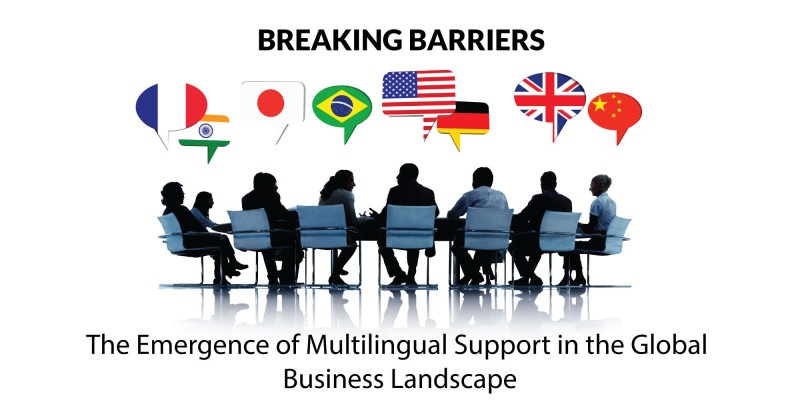In our increasingly interconnected global economy, the emergence of multilingual support has become a cornerstone for business success. This shift towards embracing multiple languages in customer interactions is more than a mere convenience—it's a strategic necessity that is reshaping how companies engage with a diverse customer base. We'll delve into the vital role of multilingual support in modern business, emphasizing its impact on customer experience, market expansion, and the fostering of cultural sensitivity, with a special focus on how companies are pioneering in this area.
The Global Marketplace and Enhanced Customer Experience
In today's interconnected world, the global marketplace is not just a business trend, but a pivotal aspect of growth and sustainability. As companies venture into new markets, the need for multilingual customer support becomes more pronounced. This extends beyond mere translation; it involves cultural sensitivity and understanding of local nuances. A customer who receives service in their own language is more likely to feel a sense of connection and trust with the brand. This is particularly vital in an era where social media and online reviews amplify customer experiences. Companies that excel in providing tailored, multilingual communication are better positioned to build a loyal customer base, stand out in competitive markets, and harness the power of global connectivity. Furthermore, this approach resonates with the growing emphasis on inclusive business practices, ensuring that no customer feels alienated due to language barriers. Ultimately, the integration of multilingual capabilities is not just a customer service enhancement; it's a strategic business move that acknowledges and respects the diverse tapestry of the global customer base.
Competitive Edge and Cultural Sensitivity
Offering support in multiple languages gives businesses a big edge over competitors. It shows customers that a company cares about their language and culture. This is a key way to stand out in a busy market. Understanding culture is just as important as speaking the language. It's about more than just changing words from one language to another. It's about making sure the message fits with the customer's culture, which helps build trust and a strong connection.
This approach is not just smart for business; it shows that a company is committed to respecting and including people from different cultures. In today's world, where buyers care a lot about social issues, companies that respect cultural differences can build a loyal following and improve how people see their brand. This also helps avoid misunderstandings and mistakes that could hurt the company's image. Plus, when a business truly understands its customers' cultures, it can better tailor its products and services to meet their specific needs. In short, investing in language and cultural understanding is not just about doing well in the global market; it's about being a caring, customer-focused brand in a world that is more connected and diverse than ever.
The importance of cultural sensitivity in multilingual support cannot be overstated. It involves recognizing and respecting cultural differences in communication styles, values, and expectations. For instance, a marketing message that resonates with a Western audience might not have the same impact in an Asian market. Similarly, customer service representatives need to be aware of cultural nuances in etiquette and conversation to effectively engage with customers from different backgrounds. This level of cultural awareness helps in avoiding misunderstandings and strengthens the customer relationship.
Challenges and Technological Innovations
While the benefits of multilingual support are clear, implementing it comes with its own set of challenges. It demands significant investment in hiring skilled multilingual staff, training them to handle cultural nuances, and integrating efficient technology to support these operations. Ensuring consistency in service quality across different languages and cultures requires a strategic approach and a commitment to ongoing training and development.
Technological advancements, such as AI-powered translation tools and multilingual chatbots, are playing a pivotal role in overcoming these challenges. These innovations are making it easier for businesses to provide accurate and efficient support in various languages. However, technology alone cannot replace the human element, especially when it comes to understanding cultural hisubtleties. Hence, training and continuous development of staff remain crucial.
Customized Solutions by IdeasUnlimited

Recognizing the unique needs of each business, IdeasUnlimited offers bespoke multilingual support solutions. Whether it's for a small startup aiming to make a global footprint or a multinational corporation streamlining its international customer support, IdeasUnlimited customizes its services to meet the specific needs of its clients. This tailored approach ensures that businesses of all sizes can leverage the benefits of multilingual support to enhance their global presence.
The rise of multilingual support is a transformative development in the business world, offering companies a way to effectively communicate across language and cultural barriers. As businesses continue to expand their global reach, the demand for multilingual support will undoubtedly grow, making it an integral part of any comprehensive business strategy. With leaders like IdeasUnlimited at the forefront, businesses are well-equipped to navigate the complexities of a multilingual landscape, delivering enhanced customer experiences and fostering stronger global connections.
